Major: Behavioural Neuroscience
Year: 4th
Home Town: Vancouver
Fun Fact: I had to get stitches yesterday because I accidentally threw my hand on a knife that was sitting upwards drying… not so fun!
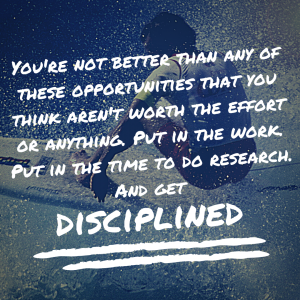
Could you tell us what your research question and hypothesis were/are?
“I’m investigating the Two-visual-systems Hypothesis, which essentially proposes that there are two systems within the brain where retinal information can travel from V1*, one governing action and the other governing perception**. “
Most broadly, I’m investigating the visual system using psychophysical methods at Dr. James Enns’s Vision Lab. I think that would be the shortest summary I can give. More specifically, I’m investigating the Two-visual-systems Hypothesis, which essentially proposes that there are two systems within the brain where retinal information can travel from V1*, one governing action and the other governing perception**. The way you can look for this in healthy participants is most commonly through visual illusions. Essentially, you see whether a participant’s perceptual response towards an illusion differs from their action response. For example, a participant may be asked to grab a central disk of an Ebbinghaus illusion – their grip aperture is measured to see the degree of illusory bias there and to compare the bias to one in a perceptual measure: their matching of a comparator disk to the central one. If the perception and action responses are different in terms of the illusory bias that they exhibit, all else equal, then there must be two different systems, each with their own unique processing capacities. But if the same degree of illusory bias presents in both measures, then maybe there’s only one visual system, processing the visual world in the same way and outputting similarly to both perception and action.
My first project was a literature review that helped to inform on-going lab investigations using illusions. I was looking at the neuroscience of behavioural measures used in illusion paradigms investigating the Two-visual-systems Hypothesis. Rather than just taking the results of these studies and speculating whether there are two visual systems, as is typically done, I instead took the behavioural measures and compared them to neuroimaging measures to see if the two coincide. This can remove much of the ambiguity of speculation but can also introduce its own challenges.
Along with that, I helped conduct a behavioural experiment with an illusion called the Simultaneous-tilt Illusion. We took an action measure, grasping, and a perceptual measure, pantomime (“fake”) grasping, towards a bar that was subject to the illusion. Like the example I gave, we asked whether the illusory biases from these responses are equal or dissociated. The results of this experiment ideally will help to address the nature, and the presence, of the two systems.
*V1 = primary visual cortex
**The system that governs action is also known as the dorsal stream, and the system that governs perception is also known as the ventral stream.
What sparked your interest in your research topic?
I was interested in getting into research in neuroscience, and I was approached by one of my TAs for Statistics, Raymond MacNeil, to join his lab. I took him up on his offer. I was interested in learning more about complex systems and I found interest in the research that Ray was involved in. He gave me many small projects and a lot of articles to read – and the more I read, the more involved I wanted to get.
It’s good to see that you were networking, making use of your TAs and professors. Everything that people tell you to do in class.
Definitely. I think I’m becoming the person who repeats the classic maxims that undergraduate students are told when it comes to getting into research, like “talk to your TAs and professors, especially if their interests overlap with yours”.
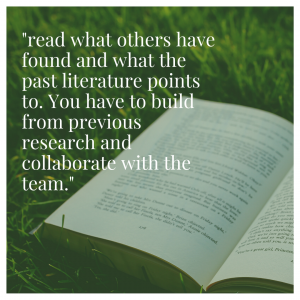
How did you build your hypothesis?
I like to think that I helped build a hypothesis. It was a long process that meant taking the time to read – read what others have found and what the past literature points to. You have to build from previous research and collaborate with the team. That’s exactly what we did – It involved a lot of discussions.
What made you feel like this was an important topic to research?
This was a question that I had myself when I was starting on this project. I was wondering if I was pursuing this line of research because I find it interesting, rather than useful. This is a rather specific area of research, wondering whether there are two visual systems in the brain, and one might ask: what is the practical use for that? That question was answered when I watched some videos exemplifying the implementation of neuroscience into artificial intelligence (AI). I really began to respect the fact that what we were researching could inform things like robotics and embodied cognition*. You need to make the neural architecture clear before modelling the brain. Beyond this, though, in order to even treat brain dysfunctions, you must understand the circuitry, which is what we are attempting to do.
*Regarding AI, the idea that you cannot create a functioning robotic tool without a body (along with the “neural” circuitry).
Did you have to make any adjustments to your project due to COVID? Did the transition from in-person studies to online studies disrupt your research findings? How did you and your team overcome it?
My supervisor immediately began to draft a COVID safety protocol, which I helped him with. We pursued it pretty quickly such that we were able to resume in-person research as early as the first summer semester. I’m continuing to run participants now. Thankfully, we did not run into much difficulties. We certainly had to collaborate more virtually, over zoom, but I’m sure everyone had to. To be honest, I’m grateful to have had that experience because it is a skill that you need, whether in a pandemic or not. It’s a soft skill that you develop through your undergrad years: how to communicate, especially through email. If I look back on my initial emails to the grad student I am working with, they are hilariously bad (with long intros and all that), but I have learned to become more efficient.
What was your favourite part of the process?
Probably the feeling that I’m building on what others have found out in the past. Researching this hypothesis while trying to come up with scientific questions really felt as though I was standing on the shoulders of giants. I’m also amongst these amazing researchers in the Vision lab. It made me very grateful. Those same impressive researchers were also treating me as an equal and a colleague, and that felt cool because they were really listening to my input. I learned, and still am learning, so much from them.
By being involved in research, you’re being involved in the next step forward – that’s what research is all about.
It’s such a cool feeling – that you are part of a new question to be answered. Maybe only people who like research will get that, but it’s something I want others to experience.
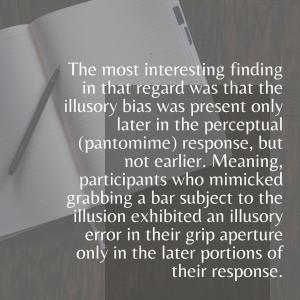
Is there anything you can share with us about the results that you found? What trends/conclusions did you observe? What was the most surprising observation from your study?
I’m still editing the literature review – trying to prepare for publishing. The most interesting thing in its regard is just how nuanced this literature can be, and how it isn’t so cut and dry where one might think it would be. I think neuroscience is filled with that.
Now, I’m working on the experiment that I mentioned earlier. The most interesting finding in that regard was that the illusory bias was present only later in the perceptual (pantomime) response, but not earlier. Meaning, participants who mimicked grabbing a bar subject to the illusion exhibited an illusory error in their grip aperture only in the later portions of their response. That was very cool for us.
The way we reconcile it, in the same way that the Two-visual-systems Hypothesis would predict, is that the error arises because of the timing of the perceptual stream (the ventral stream) processing versus the action stream (the dorsal stream). The perceptual system is much slower than the action system, and a response like pantomiming may be affected by perceptual p[rocessing only as the response plays out, rather than immediately. This is what I meant by speculation from behavioural findings – you get results that you hope map onto, or tell you more about, what is already known about the circuitry.
When you did your earlier literature review, did you just look at neuroimaging data, or did you also look into other aspects such as neuroanatomy?
I did look into neuroanatomy – kind of; I only included human data and was limited in that regard. However, a lot of articles employ DCM (direct causal modeling) analysis. I don’t fully understand it, but it takes 1) Bayesian probability, 2) your a priori knowledge about the brain and 3) feeding many competing connection models into a program. The program gives an output essentially telling you the probability that a given model is responsible for your results. For example, it may tell you that there is a 90% probability that two ventral stream structures are connected, given the available data. It’s computational neuroscience.
What will you be doing with your data and conclusion now? How do you plan on presenting it?
We just finished recruiting participants. Now, I’ll be helping with the data analysis and I will be writing a report on that and submitting it for grading for my directed studies course. I’ll also be starting another project, either an extension of the Simultaneous-tilt illusion I told you about or using another illusion to address a different question. Because, really, there are so many illusions you can use to investigate this hypothesis, and there are endless questions!
Visual illusions are a very useful method for psychophysics. It’s easy to appreciate how cool they are, but it’s hard to conceptualize how useful they can be.
How do you see the results of your study being applied in the real world?
As I said, I think it ties back to why I felt so strongly about pursuing this. I do think it can help a lot with informing models of the human brain. Whether that be for AI or for ameliorating damage to the brain. Companies like Neuralink are working on this right now. I think that their major difficulties at the moment are more on the engineering side, but once they overcome that, it’s going to be neuroscience. You need to know how the brain is computing the external world so that you can fix when it goes awry, and also to maybe create things that mimic it.
If you could do your study again, what would you do differently and why?
I would put in much more work into my plan of action prior to getting started, particularly with the literature review. I think if I made my research questions more explicit to myself – exactly how I was going to answer those, who my audience was, and what I hoped they would get out of it – that would have made things much more streamlined for myself.
What course(s) do you think were most helpful in gaining background knowledge about your research topic?
I think PSYC 367: Sensory Systems, which I’m in right now – it teaches you a lot about psychophysical methods and how useful they can be. I wish I had taken this course before I started all my research. It is so useful if you’re in the psychophysics world, and you want to understand the jargon (like what psychophysics means, which essentially just means behavioural experimentation looking into stimulus-response relationships).
It’s impressive how you managed to go into visual systems research without having the PSYC 367 background.
The more articles you read, the more you come to understand the topic. But then, you can take a course like Sensory Systems and realize you completely misunderstood something!
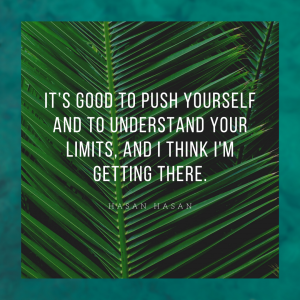
How has managing your project helped you grow, both personally and professionally?
I think that it helped me feel the contours of my limits. It’s good to push yourself and to understand your limits, and I think I’m getting there. That’s a continual process which I hope to keep at. I want to pursue research, so on the professional side of things: I’ll be graduating with two years of research experience under my belt, which is amazing to think about. This is not just experience in undergrad. This is going to be experience for, say, getting a job, and I think it’s definitely going to be useful.
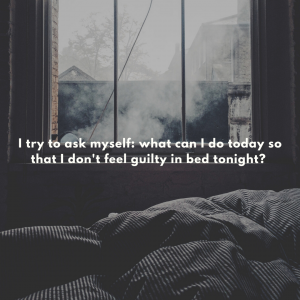
Tell us about how you stay organized and manage your time while doing a
DS project. How do you prioritize and motivate yourself?
I try to ask myself: what can I do today so that I don’t feel guilty in bed tonight? Because that guilt is not worth it. I think that really motivates me. I also really like to practice my discipline in the littlest things to see if I can maintain a routine. Routines are obviously essential, but there are these micro-routines that can tell you if you’re slipping off-track. For example, disobeying a given micro-routine can act as a signal for you to take a step back and look at the big picture. It’s hard to know when you are not living up to your standards if not for those. If you stopped making your bed for some reason, then maybe you’ve also been neglecting other things in your life.
What was the most challenging part about doing a DS project, and what did you learn from the challenge that you can apply to future research/life?
The most challenging part was summarizing my research in a way that’s understandable to others who are not familiar with it. I like to think that I am good at communicating and presenting, but presenting scientific findings is a whole different challenge. You have to take a nebulous, complex topic that people will only find interesting if they truly see the utility of, and you have to make that understandable. It made me realize, in a more abstract sense, that it’s more important to make things communicable rather than just present the things that sound good or seem cool. I think the priority for communicating science is communicability, then comes conveying the interest, though one may beget the other. It’s unfortunate if you’re doing research that you think is interesting but fail to explain to others.
I’m always practicing just summarizing my work. Even when I debrief participants, I’m practicing presenting because they are naive to my research and it’s a great opportunity.
What was the most rewarding and what did you like the most during the process?
I learned so much. In hindsight, I think the most rewarding part will be just how much writing I was doing. I probably did an order of magnitude more writing than I would have done if I never joined a lab. And that’s very, very useful, especially if you’re going into research. Writing is thinking, if you abstract it out, and I was given a lot of opportunities to think in a dialectical sense. I think that was most rewarding.
How do you network within the psychology community, and where have you made your most valuable connections?
I try to reach out to colleagues and see what they think about articles that I’m reading. I also have connections with these researchers that I look up to, so I try to communicate with them a lot. But I try to talk to my classmates about what they’re doing because, and we were talking about this before the interview started, I do think it’s very useful to know what other students are pursuing to see if you can assimilate some of their strategies into whatever you’re doing.
What are your other interests outside of Psychology? Are you a part of any clubs or teams?
Well, I’m not part of any clubs right now. But, I like to read a lot – mostly philosophy, a lot of existential philosophy and psychoanalytic-adjacent works. I also really like Nutrition. I’m studying the visual system a lot, but I’m very interested in the link between nutrition and neuroscience. It’s fascinating how lifestyle and diet can affect cognition and actual neurobiology. I’m planning on embarking on a project that can exemplify this interest and that can serve as a test for myself on what I can produce of the knowledge I have on it.
What are your professional goals and plans for the future? What do you see yourself doing in 5 years’ time? 10 years’ time?
Five years from now, I’ll hopefully be pursuing a PhD in neuroscience. Hopefully it will consist of a collaboration with nutrition labs, as well, where we’re investigating human nutrition and its effects on cognition. In ten years, I hope to be helping others understand the link between neuroscience and health. Whether I’m a professor or a researcher (but hopefully both) in ten years, I think I’ll be content. I hope to also provide practical health and nutrition applications informed by robust neuroscience research. From things like advice on how to implement the latest findings, to programs and devices that may help with that implementation.
How has working on this research allowed you to develop soft skills and become a better person/a step closer than who you want to be?
I think it helped me stress-test ideas, and also helped me realize that you couldn’t do that fully unless you’re collaborating with others. University is meant to be a place for that, where you learn how to test hypotheses and critically think about the things that are intriguing to you.
When you’re doing research, you do actually have to work with a lot of people. And I know that comes with challenges because I have personally experienced that myself. The other person may not have the same energy as you do. And their interests may differ. So I mean, what do you suggest are some ways of functioning in a group and succeeding?
I’m fortunate to have researchers that I really respect and look up to, so I mostly defer to them. I’m an undergraduate student and, of course, I say my piece, but ultimately they know more than me. But in groups where we have issues, say, with agreement, I think those are the most important times because those disagreements allow you to practice making your case for whatever idea that you want to pursue. I think humility is very important in that regard, in that you might be wrong. You have to realize that you might be wrong. And hopefully your collaborator also has that humility. If they don’t, then that’s a whole other issue that you have to contend with.
Is there anything important you’d like to say that I haven’t asked you about?
The best advice I’d give to anyone in undergrad is to pay your dues. You’re not better than any of these opportunities that you think aren’t worth the effort or anything. Put in the work. Put in the time to do research. And get disciplined.

